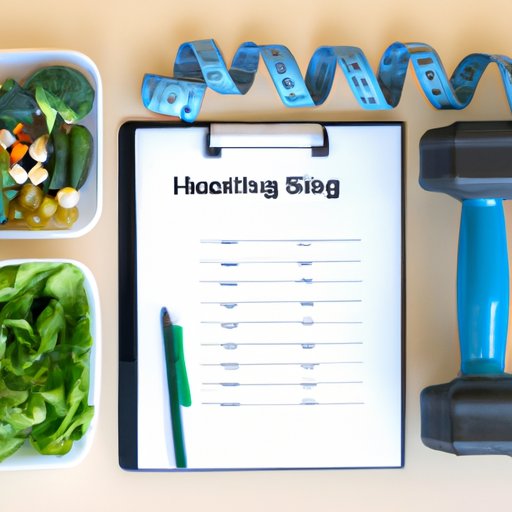
I. Introduction
Are you trying to gain weight but struggling to do so in a healthy way? You’re not alone. Many people assume that gaining weight simply means eating as much junk food and as many calories as possible. However, this approach can lead to a host of health problems and is not sustainable in the long run. In this article, we’ll explore how to gain healthy weight by focusing on nutrient-dense foods, resistance training, meal planning, caloric intake, and rest and recovery.
II. Focus on Nutrient-Dense Foods
Nutrient-dense foods are those that are high in nutrients and low in calories. These foods are an excellent choice for weight gain because they provide your body with the nutrients it needs without excess calories or unhealthy additives. Examples of nutrient-dense foods include:
- Leafy green vegetables like spinach and kale
- Fruits like berries and citrus fruits
- Whole grains like brown rice and quinoa
- Lean proteins like chicken, fish, and beans
It’s important to choose high-calorie nutrient-dense foods, such as avocados, nuts, and seeds. These foods can help you increase your calorie intake without sacrificing nutritional value.
III. Resistance Training
Resistance training, also known as strength training, is an important component of healthy weight gain. This type of exercise involves lifting weights or using resistance bands to build muscle mass. Muscle is more dense than fat, which means that it takes up less space in your body. By building muscle, you can increase your weight in a healthy way.
Examples of resistance training exercises include:
- Squats
- Bench press
- Deadlifts
- Rows
It’s important to start with light weights and gradually increase the weight as you build strength. Speak to a personal trainer to ensure proper form and technique to avoid injury.
IV. Meal Planning
Meal planning is key to healthy weight gain because it helps ensure that you’re consuming enough calories and nutrients throughout the day. When you plan your meals in advance, you’re less likely to skip meals or reach for unhealthy snacks.
When planning your meals, aim for a balance of macronutrients: carbohydrates, proteins, and fats. Make sure that you’re getting enough of each macronutrient to support healthy weight gain.
It can be helpful to prepare your meals in advance and pack them in containers. This way, you’ll always have healthy food on hand even when you’re busy.
V. Caloric Intake
Caloric intake refers to the number of calories you consume in a day. To gain weight, you need to consume more calories than you burn. This can be challenging if you have a fast metabolism or are very active.
To track your caloric intake, you can use apps like MyFitnessPal or Fitbit. These apps can help you determine how many calories you need to consume in a day to achieve your weight gain goals.
VI. Rest and Recovery
Rest and recovery are just as important as exercise and nutrition when it comes to healthy weight gain. Your body needs time to recover from exercise and build muscle. If you don’t give your body enough time to rest, you can end up with injuries and other health problems.
Schedule regular rest days, and make sure to get plenty of sleep. Aim for at least 7-8 hours of sleep per night to give your body enough time to recover and rebuild.
VII. Conclusion
Gaining healthy weight is not as simple as eating as much junk food as possible. It requires a combination of nutrient-dense foods, resistance training, meal planning, caloric intake, and rest and recovery. By focusing on these areas, you can gain weight in a healthy and sustainable way. Remember to speak to a healthcare professional before starting any new diet or exercise regimen.
With dedication and patience, you can achieve your weight gain goals and feel your best self.





